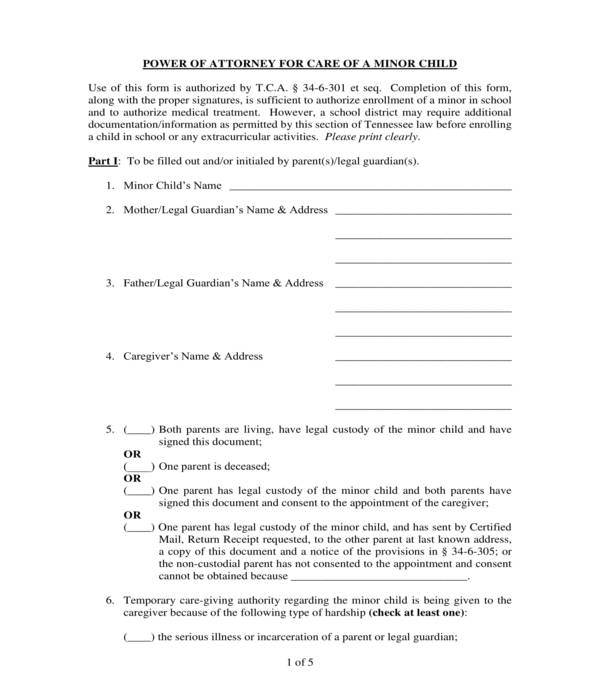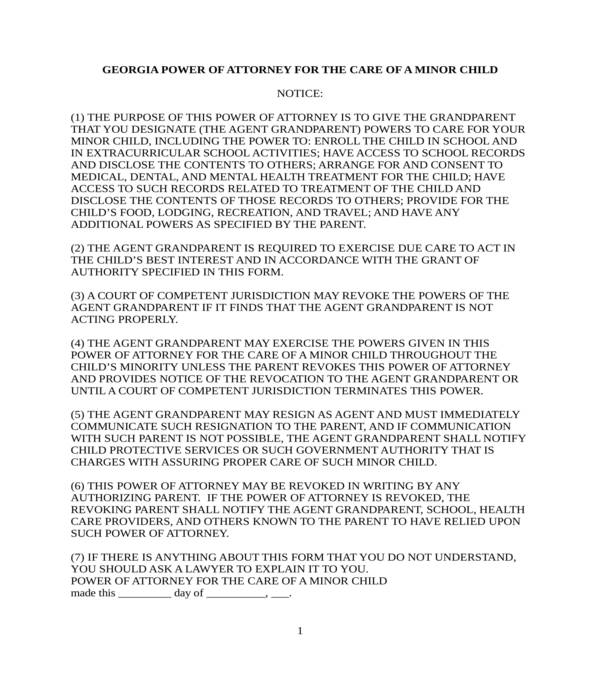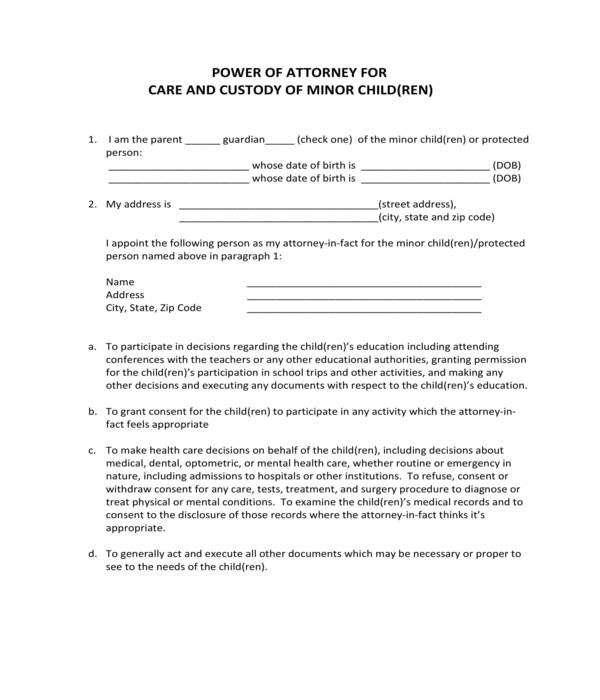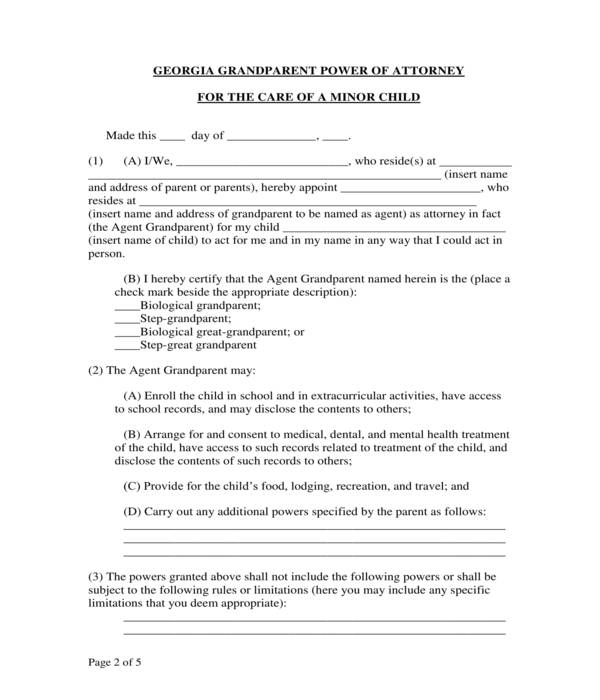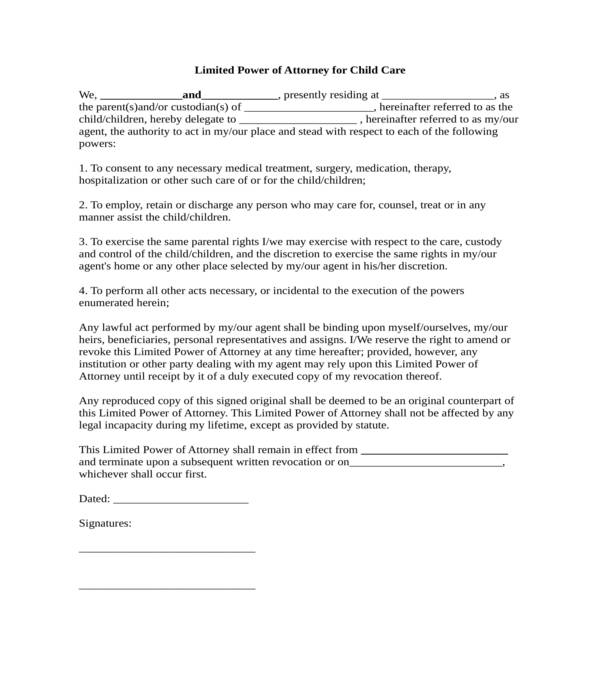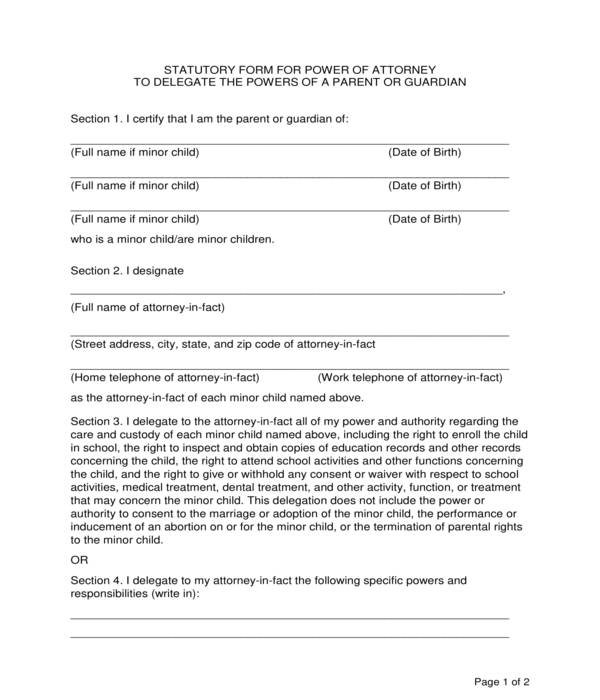Minor child power of attorney forms are documents which are intended to assign a person to act on behalf of a parent or a legal guardian who is not available to make decisions for a minor or a child. The form needs to be signed by the child’s legal guardian and a notary public.
Usage of Minor Child Power of Attorney Forms
There are a lot of circumstances which calls the need for creating and using a minor child power of attorney form, and one of the most common instances is when a parent or both parents will be traveling. Regardless of the reason for the parents to travel, either due to personal reasons, for a business or for military deployment, a minor child power of attorney form must be created and signed.
Another circumstance when the form will be used is when a parent could not be available immediately for dealing with events, activities, and emergencies where the child can be involved. Nevertheless, the grantee to be chosen and assigned should be known by the child, knows the needs and preferences of the child, and most importantly, is responsible.
Minor Child Power of Attorney Form Sample
Minor Child Power of Attorney Form in DOC
How to Create a Basic Minor Child Power of Attorney Form
Creating a minor child power of attorney form is easy; however, it is important that before the form will be finalized, the contents of the form must first be checked and be reviewed by an attorney or a notary public. Nonetheless, the steps below must be followed in order to create a basic yet effective minor child power of attorney form:
Step 1: Prepare the sheet to be used for the form.
The sheet to be used should be prepared which must include the size preferences for the margins and fonts to be used for making the content. After the sizes and page layout specifications are edited, the title of the form must be placed as the first element in the topmost center part of the form along with a set of instructions and guidelines below the title.
Step 2: Identify the child, the grantor, and the grantee of the power.
The general information of the child or the minor along with the details of both the grantor and the grantee of the power should be disclosed such as their names and addresses. Their contact information can also be stated as well as their relationship with the child.
Step 3: Enlist possible situations that the child or minor is involved in.
In this section, the grantor of the power must state his initials in each item which specifically describes the current situation of the child or minor. The situations to enlist should determine the legal custody of the child and whether or not his parents are still alive.
Step 4: State the reason or purpose of the power of attorney assignment, and the authorization of the grantor of the power.
The assigned party or the grantee is the one who will be assigned to be responsible for the child’s welfare. This section should indicate why there is a need for a party to be assigned to take care of the child or minor such as either due to the incapacitation of a parent or due to loss of a home as a result of a natural disaster. In addition, authorization statements from the grantor of the power should also be included in this section of the form.
Step 5: Include a notary acknowledgment statement and a signature block.
A notary acknowledgment statement is important to be incorporated into the form to document the affirmation of a notary public towards the identities of each involved party. Separate notary acknowledgment statements along with signature blocks should be placed into the form for the grantor and the grantee.
Lastly, the minor child power of attorney form should be saved into the desired format, either in “.DOC” or in “.PDF”. Each format has its own advantages and disadvantages which is why it is important to identify the method of using the form. For instance, a minor child power of attorney form in “.PDF” will be suitable for email transmission and submission while “.DOC” format can be chosen for printed power of attorney forms.
Minor Child Care and Custody Power of Attorney Form
Minor Child Care Grandparent Power of Attorney Form
Minor Child Power of Attorney Form FAQs
Should a grandparent obtain a signed minor child power of attorney to have the child undergo a medical treatment?
Yes. In most States, grandparents are allowed to take their grandchildren or a minor to see and undergo medical examinations, however, when it comes to requesting medical treatment for a child, the grandparent should prove his guardianship first. The guardianship can be proved by presenting a signed minor child medical power of attorney to the doctors of the medical institution.
Should both parents of a child or minor sign the power of attorney?
If the child’s parents are married, then they must both sign the minor child power of attorney form unless one of them is deceased. On the other hand, if the parents are not married and are separated, a written notice indicating the intent and purpose of the minor child power of attorney can be sent to the other parent instead.
How long does a minor child power of attorney last?
The duration or length that a grantee has in a minor child power of attorney will depend on the laws of the State or country where the power is granted to the grantee. Nevertheless, the grantor can revoke and cancel the power that he had given to the grantee at any time, but the revocation of the power of attorney should be done in writing for it to be accepted as a legal document.
Minor Child Limited Power of Attorney Form
Minor-Child Parent Delegation Power of Attorney Form
Minor Child Power of Attorney Form Tips
When making a minor child power of attorney form, a grantor should ensure that the rights that he grants to the grantee are specific and limited. For instance, the grantee will not be allowed to make decisions in lieu of changing schools, marital status, and entering in institutions without the prior approval of the grantor.
Another tip to keep in mind is to remember and observe the rules of State, especially when it comes to the execution of the power. To easily do this, a grantor and his grantee should both have their own attorneys or lawyers who can inform them about the process and the State’s requirements.
Related Posts
-
Free 10+ Minor Power of Attorney Form Download – How to Create Guide, Tips
-
10+ Free New Hampshire (NH) Power of Attorney Form Download – How to Create Guide, Tips
-
10+ Free Nevada (NV) Power of Attorney Form Download – How to Create Guide, Tips
-
10+ Free Nebraska (NE) Power of Attorney Form Download – How to Create Guide, Tips
-
10+ Free Montana (MT) Power of Attorney Form Download – How to Create Guide, Tips
-
10+ Free Missouri (MO) Power of Attorney Form Download – How to Create Guide, Tips
-
10+ Free Minnesota (MN) Power of Attorney Form Download – How to Create Guide, Tips
-
10+ Free Mississippi (MS) Power of Attorney Form Download – How to Create Guide, Tips
-
10+ Free Massachusetts (MA) Power of Attorney Form Download – How to Create Guide, Tips
-
10+ Free Maryland (MD) Power of Attorney Form Download – How to Create Guide, Tips
-
10+ Free Maine (ME) Power of Attorney Form Download – How to Create Guide, Tips
-
10+ Free Louisiana (LA) Power of Attorney Form Download – How to Create Guide, Tips
-
10+ Free Kentucky (KY) Power of Attorney Form Download – How to Create Guide, Tips
-
10+ Free Kansas (KS) Power of Attorney Form Download – How to Create Guide, Tips
-
10+ Free Iowa (IA) Power of Attorney Form Download – How to Create Guide, Tips

